Who’s in for a spectacular road trip through ancient Greece? With stunning landscapes, pristine turquoise waters, tasty dishes, and plenty of things to do and see, a Peloponnese Road Trip is perfect! Read on as we tell you all about the great things we’ve learned on our recent journey.
We love traveling in Greece, and yes, we’ve done it a lot! We’ve boated to some fantastic islands like Chios and Rhodes. We’ve road-tripped from Athens to Thessaloniki, taking in amazing sites. Some of the mainland sites we’ve visited are Delphi, Vergina, and Meteora!
So on this last trip, we wanted to go in another direction, and see more of the country. We headed south from Athens to explore the Peloponnese Peninsula.
We found such an abundance of fun things to do and see, that we felt that we just couldn’t get it all done in seven days. But hey, we gave it our best shot, and finished with a sigh of accomplishment; we did quite a bit during our road trip.
In this article:
- Where is the Peloponnese Peninsula?
- Rental Cars and Road Conditions
- Our Peloponnese Road Trip Itinerary
- Stops and Sights along the Way
Want to hear more about our Peloponnese Road Trip? Listen to our podcast.

Where is the Peloponnese Peninsula?
Located south of Athens in a stunning coastal and mountainous area, the Peloponnese Peninsula is one of the most visited, with good reason, areas of Greece. The peninsula encompasses about 21.5 sq. km. and is situated with the Ionian Sea to the west and the Aegean Seas to the east (source).
It is steeped in ancient history and is featured in many Greek myths. Jim and I couldn’t wait to go and really explore this fantastic part of the country.
Rental Cars and Road Conditions on the Peloponnese
Most road-trippers in Greece will fly into Athens to start their trip, just as we did. This makes the Athens Airport the natural point to pick up the rental car. Of course, as is true around the world, there is always an extra fee for airport pickup and drop off, but in many cases, it’s worth it.
One question that always comes up when renting a car in another country is “Do you need an international driver’s license?” Researching for this trip gave mixed answers, both yes and no. I made sure to have my IDL but then didn’t need it in the end. Regardless, it’s always a good idea to have it with you while traveling and driving. They are easy to obtain, just take your current license to a nearby AAA office and they will hook you up.
We arrived late in the evening and we could have picked up our car that night, but since it was so late we knew we wouldn’t be hitting the road until the next morning. We stayed in a small hotel near the airport with a free shuttle that picked us up and then brought us back to the airport in the morning. We were quickly in our car and on the way.
For this trip, we were focused on the Peloponnese so we drove right around Athens on the highway and then down the A8 to Corinth. There are tolls on this road, but they are cheap and easy to pay right at the toll gate with cash or card.
From Corinth, we left the highways and stayed on secondary roads pretty much the rest of the time until heading back to Athens at the end of the trip. We covered quite a lot of ground on those roads and found the driving easy and filled with incredible vistas. There were a few routes that were narrow single lane tracks, but those were few and far between.
Our Peloponnese Road Trip Itinerary
- Day 1 – Corinth and Kayaking the Sunken City of Epidaurus
- Day 2 – Epidaurus Theater and Ruins and Palamidi Castle
- Day 3 – Mystras, Sparta’s Olive Museum, Diros Caves, and Areopoli
- Day 4 – Kardamyli to Kalamata
- Day 5 – Pylos, Methoni, Nestor’s Palace, and Voidokilia Beach
- Day 6 – Olympia Ancient Ruins
- Day 7 – Archaelogical Site of Mycenae and Ancient Messini to Athens
Stops and Sights Along the Way
- Corinth Canal
- Epidaurus
- Napflio
- Palamidi Castle
- Mystras
- Diros Caves
- Areopoli
- Kardamyli
- Kalamata
- Pylos Castle
- Methoni Castle
- Nestor’s Palace
- Voidokolia
- Olympia
- Mycenae
- Messini
It would be impossible to list every stop we made during the course of our road trip. There were just too many pullouts where we would get out of the car for wildflowers, majestic ruins, or ocean vistas. We’ll focus, instead on the longer stops, the must-see points of interest throughout the Peloponnese peninsula.
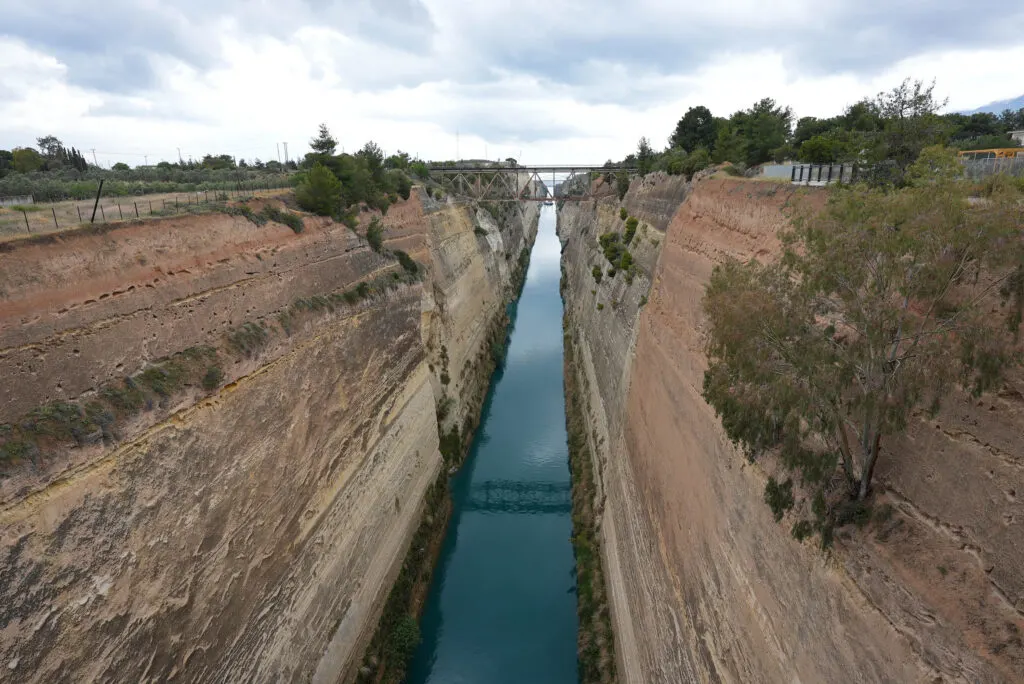
Corinth Canal
An engineering feat built in the late 1800s, the Corinth Canal was our first and quickest stop on our route. We’ve been a couple of times, and the narrowness and depth of the canal wows us. One of the best things to do while there is visit the Information Kiosk which will give you all kinds of ideas of what to do on the Peloponnese Peninsula.
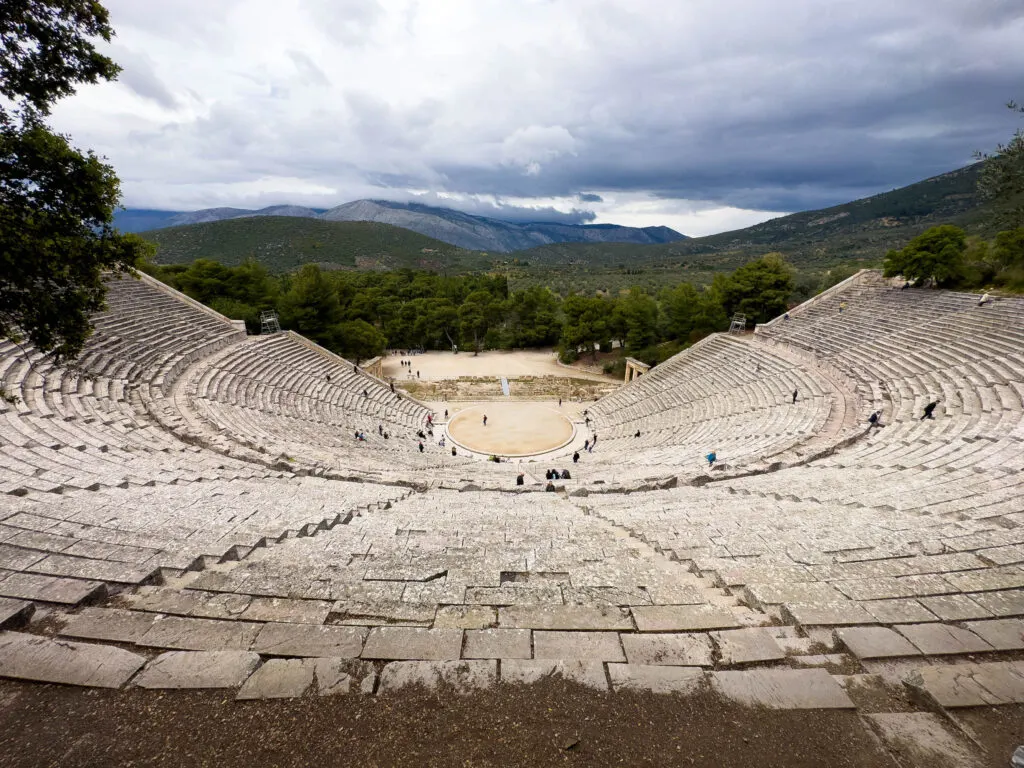
The Ancient Theater of Epidaurus
One of the many gems of the Peloponnese, the Ancient Theater of Epidaurus is such a great place to experience superb acoustics. We, along with any other person who visits, just can’t resist seeing how far your words will take you from the center of the stage.
The theater is located on a larger site, full of ruins, information placards, and of course a small museum. We spent about two hours there all told, and had a fantastic morning.
Kayaking Through the Sunken City
Not far from the larger theater of Epidaurus, stands a smaller site, complete with a smaller ancient theater, and it’s right on the water. From that beach, Jim and I took a kayaking trip to see some sunken ruins. In the water, we viewed amphoras and other building blocks of the ancient city. It was so much fun and something that if you have time, I would highly recommend.
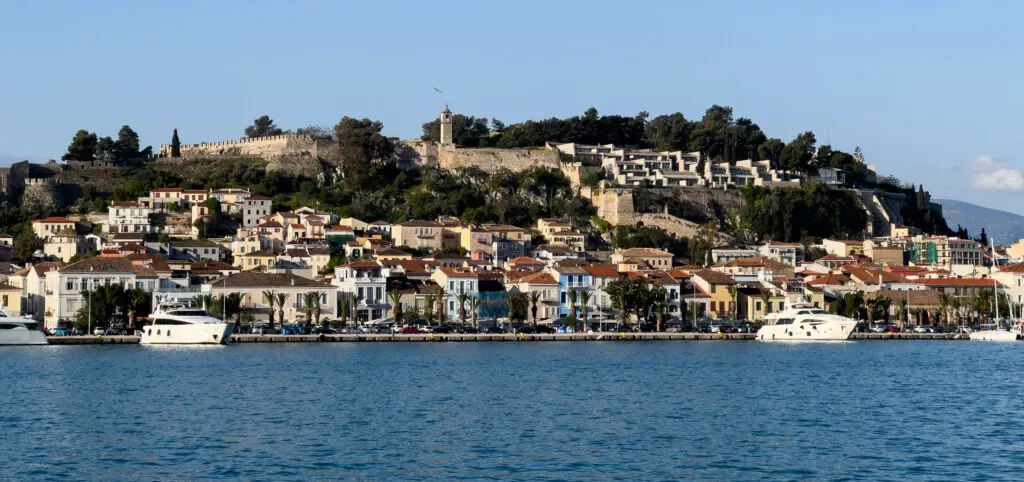
Napflio
A beautiful coastal city, Napflio has a fun downtown area with lots of shops and restaurants, but it also has a fantastic marina, a small castle in the bay, and is overlooked by the Palamidi Castle. All very much worth a few days of your time on the peninsula.
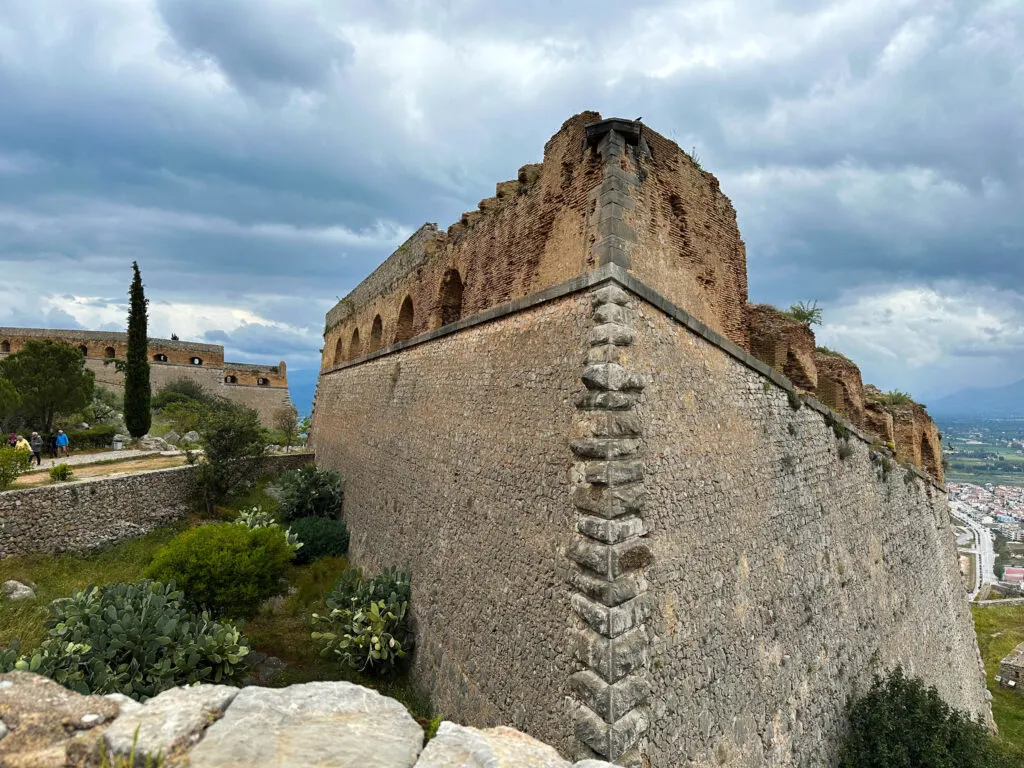
Have you listened to our Best of 2023 podcast? It talks about all the best things we did last year, and this definitely made the list! Check it out!
Palamidi Castle
Palamidi Fortress sits high above the city of Napflio. It is a huge site, and one that takes at least a few hours to really explore. Not only do you have amazing views of the bay and the city below, but inside there are plenty of buildings to wander through.
Palamidi Castle is one of the many edifices on the peninsula that dates back to the Venetians and their tireless raising of amazing buildings, like castles and fortresses. It’s easy to recognize this as the edifice will always have an imprint of a lion somewhere on a wall or above an arch. It’s their trademark.
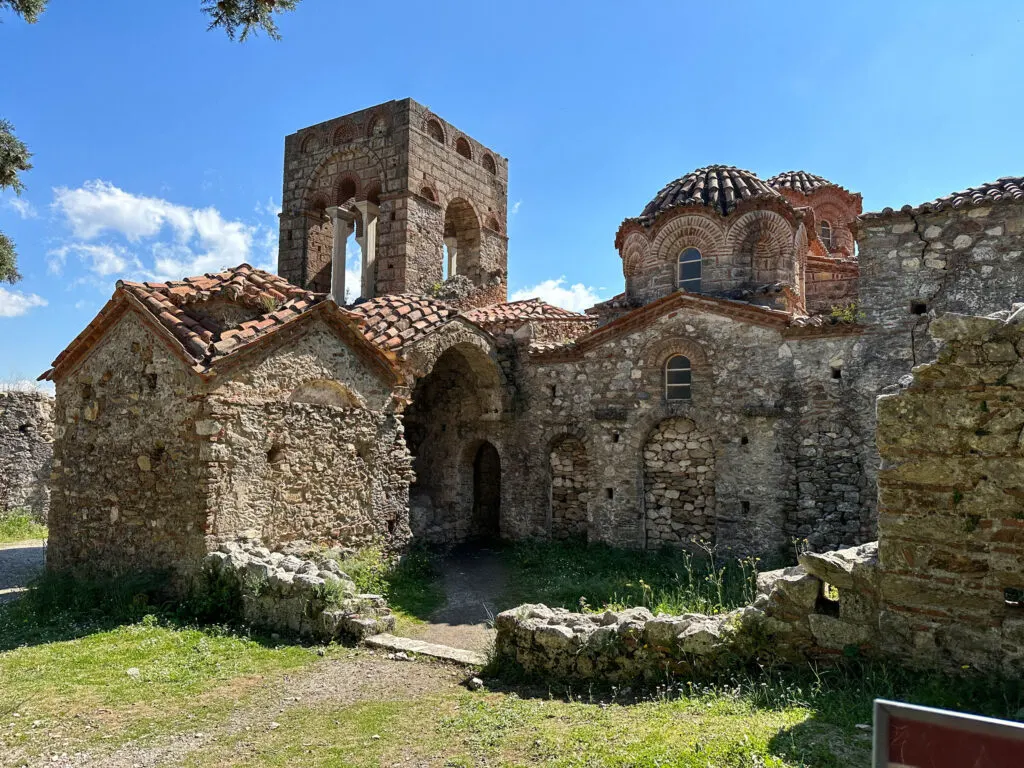
Mystras
Perched on the high slopes of Mount Taygetos and overlooking the Laconian plain (source), stands the Byzantine fortress of Mystras. Impressive it is!
We arrived right as the site was opening and climbed immediately to the castle at the very peak of the site. At first, we thought it wasn’t a very popular place to go, but upon our descent, we realized we’d just gotten there before anyone else. Yay!
The sprawling site is full of ups and downs as it clings to the side of a mountain. There are plenty of overlooks with breathtaking views, and there is a lot to visit on the site as well. We really enjoyed the Byzantine Church, museum, and of course the castle environs.
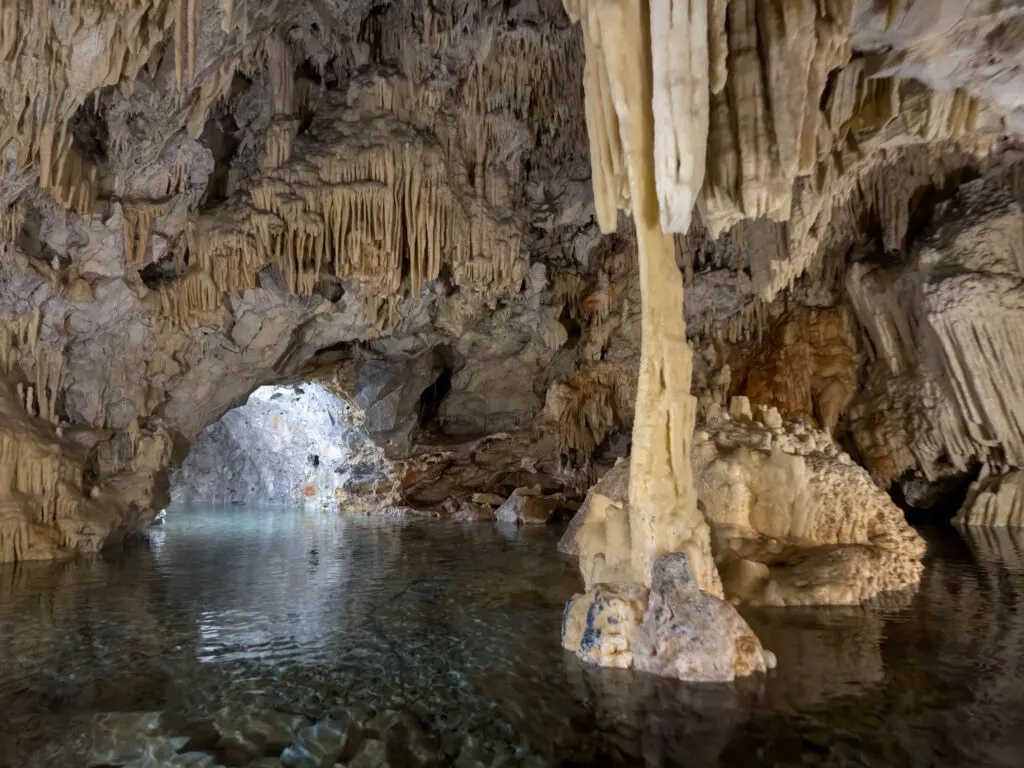
Diros Caves
The Diros Caves are a spectacular natural phenomenon on the western coast. We loved taking the boat ride through the caves, with its plethora of stalagmites and stalactites aglow with colorful lights. The entire boat ride lasted about one hour, and boy was it nice to get out of the hot sun and into a more gentle atmosphere.
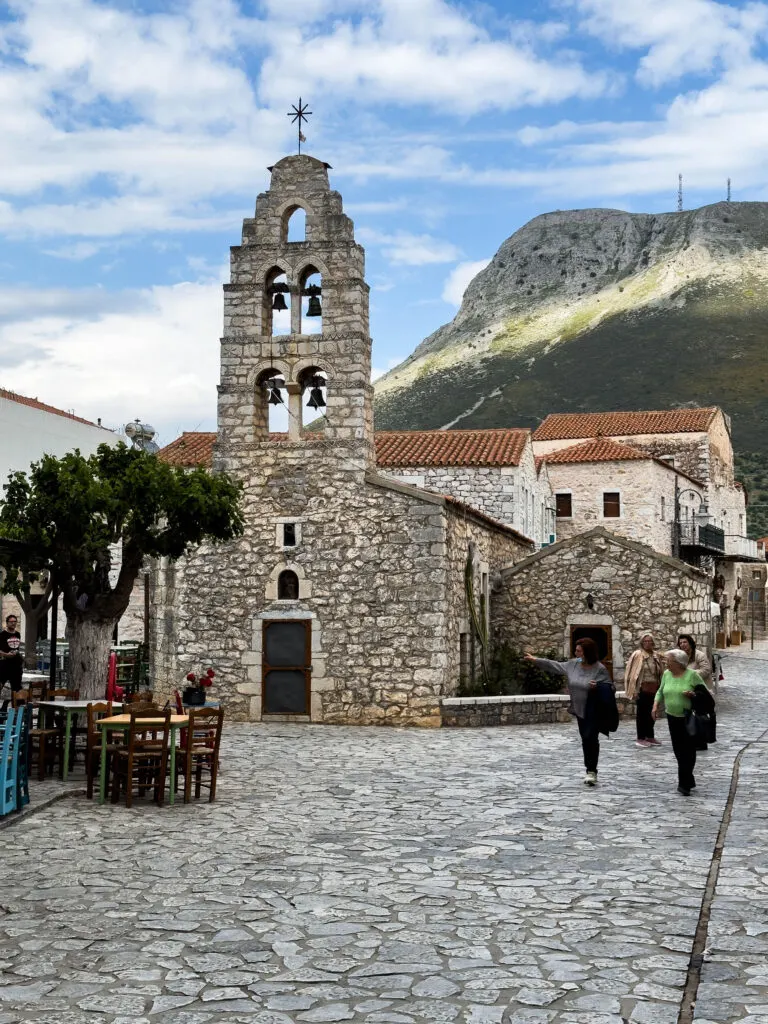
Areopoli
A small town a little north of Diros, Jim and I picked it for its reputation of being a great place to have dinner. We stayed the night and walked all over town in the evening, ending up in its lively town square where we did have one of the best dinners on our trip.
Kardamyli
For us, Kardamyli was really just a drive-through. We had heard how gorgeous the coastal town is, and we hoped to stop, wander around a bit, maybe have lunch, and then continue our drive. It is a beautiful stop with its Ottoman fortress overlooking the town and one of the most beautiful bays on the peninsula, but alas, we didn’t really have much time, and we drove on.
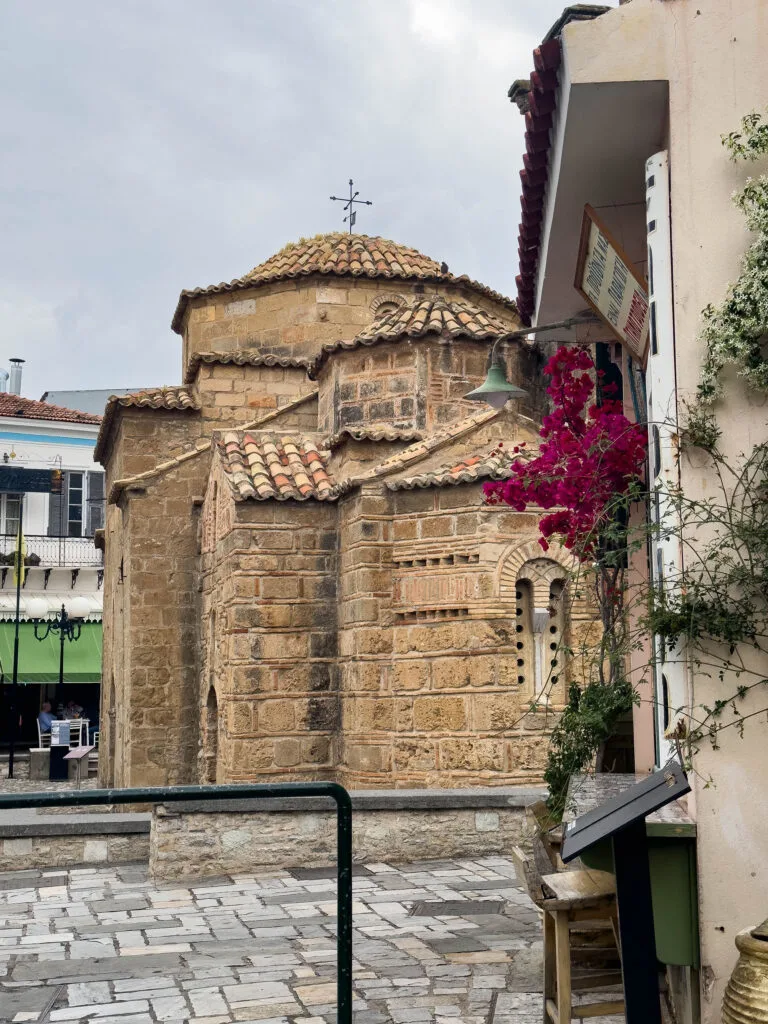
Kalamata
The second largest city on the Peloponnese peninsula, Kalamata maintains a small-town vibe. Its downtown area is quaint and hosts many wonderful restaurants highlighting the local cuisine. We spent the most time in Kalamata as we were attending a travel conference, and we were happy to bus around and find some great sights while we were there.
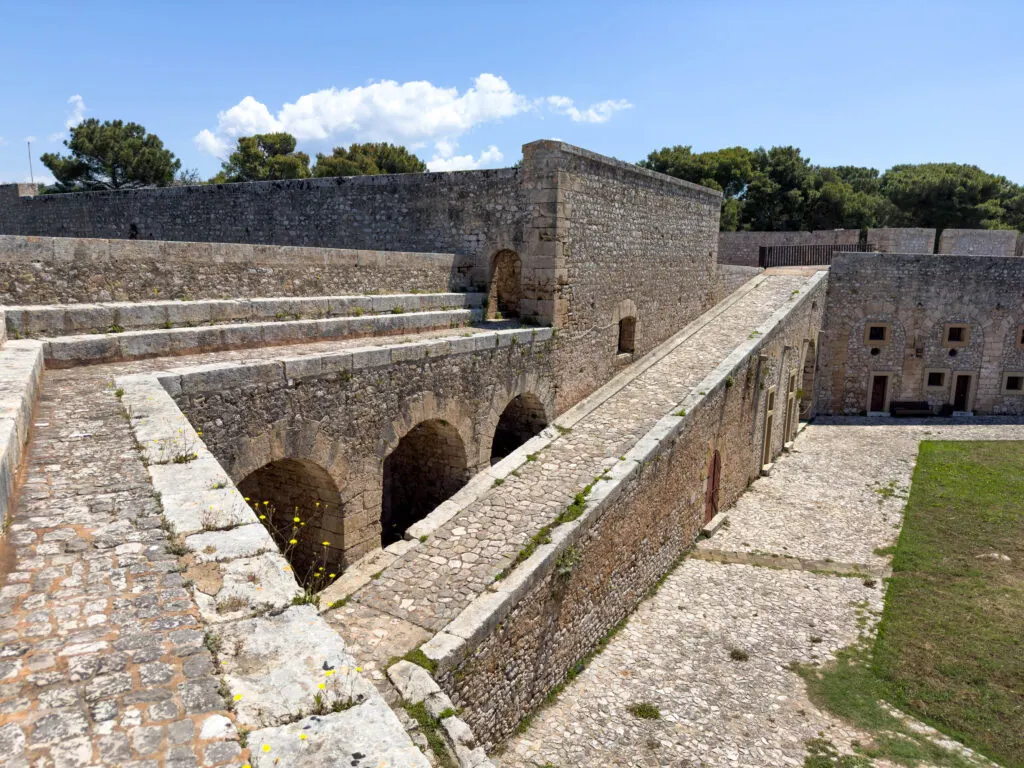
Pylos Castle
Pylos Castle, in the southern part of the Peninsula, is an impressive fortress and museum. Built by the Ottomans, it has a commanding view, which I’m sure is its strategic raison d’etre. As we walked around the grounds, you can climb the ramparts, visit the exhibits in the museum, and enjoy the view.
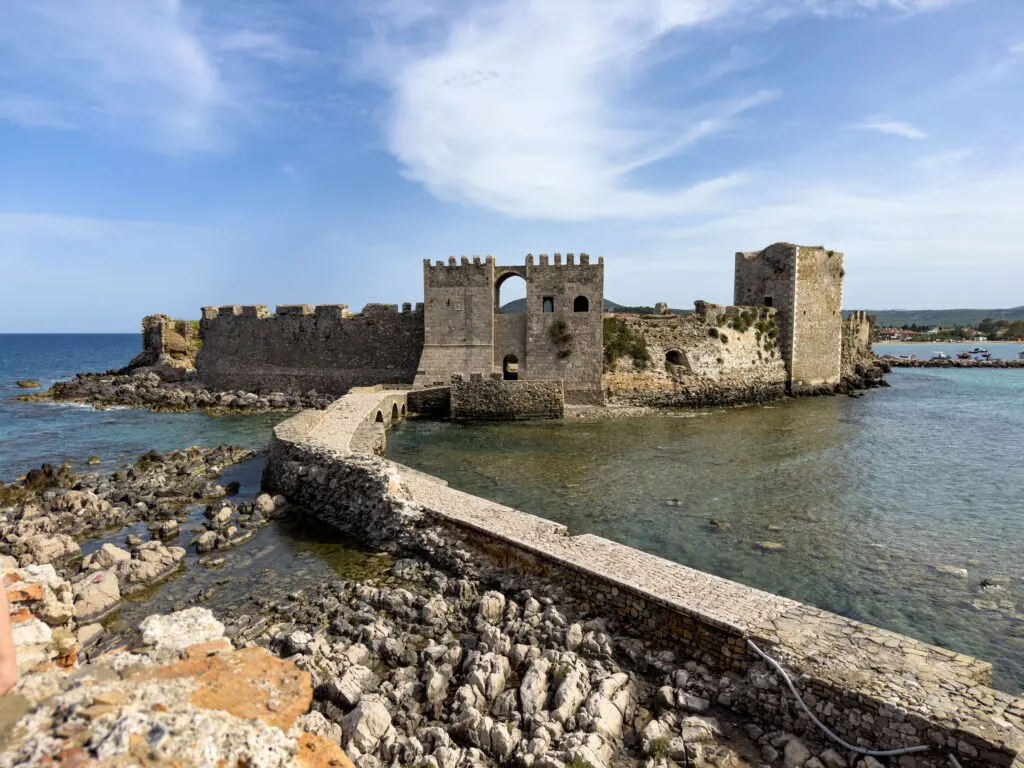
Methoni Castle
Methoni Castle is the site on the peninsula that Jim and I will remember most, and we almost didn’t make it there. The grounds of the castle are expansive, but the absolute best part of them is the fortress itself. It’s located on a small island where you have to walk across a causeway to enter, and then you can climb the tower for a magnificent view.
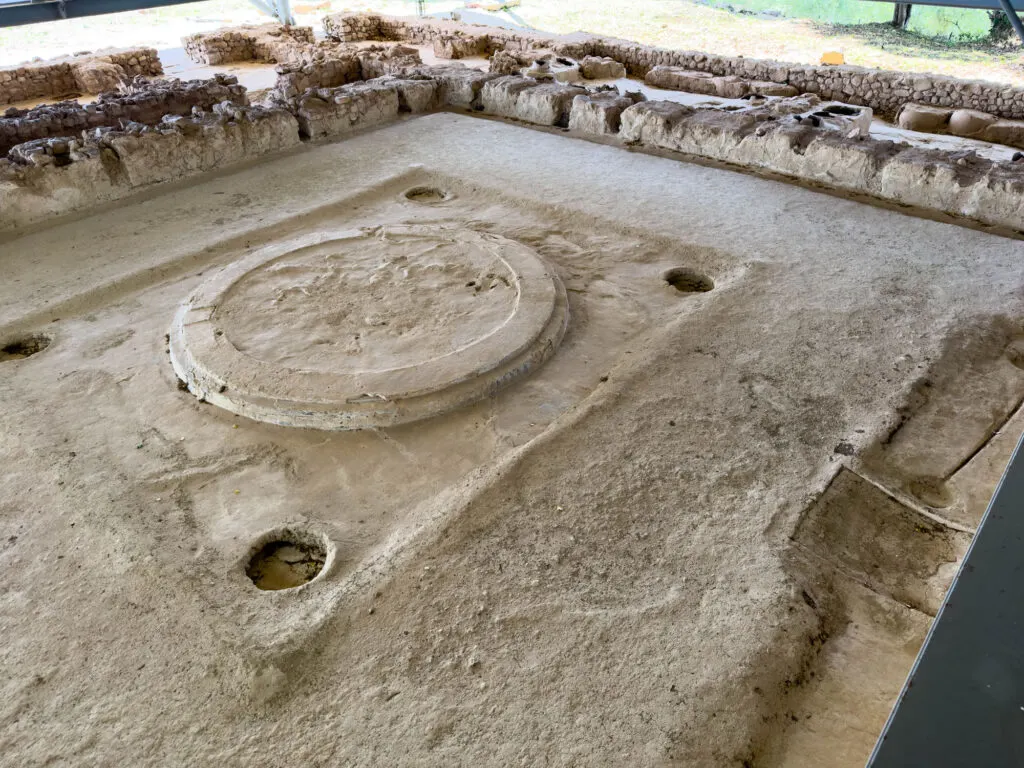
Nestor’s Palace
A small site, Nestor’s Palace is a ruin of a Mycenaen palace located near Chora. The main area is covered, and you can walk up to the viewing platforms to read the placards and get a good look at life over 3000 years ago.
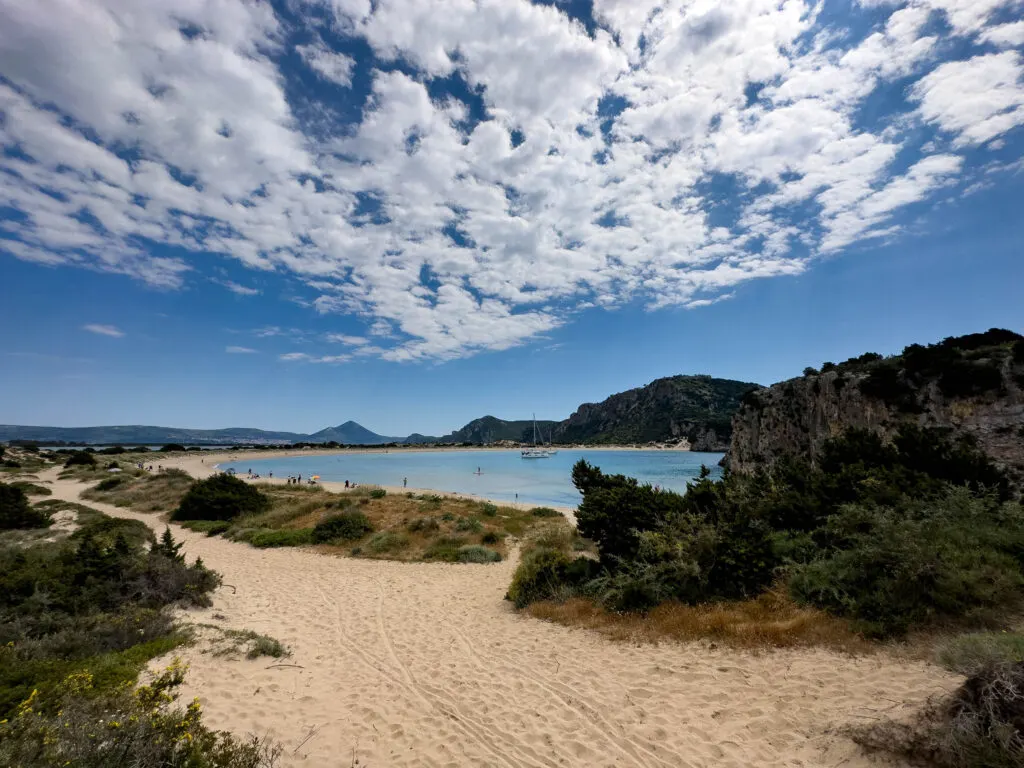
Voidokilia Beach
One of the most popular beaches on the Peloponnese, Voidokilia is known for its wildlife. We went there hoping to see flamingoes, but they hadn’t shown up yet. The beach is always busy, mainly because it’s such a gorgeous place.
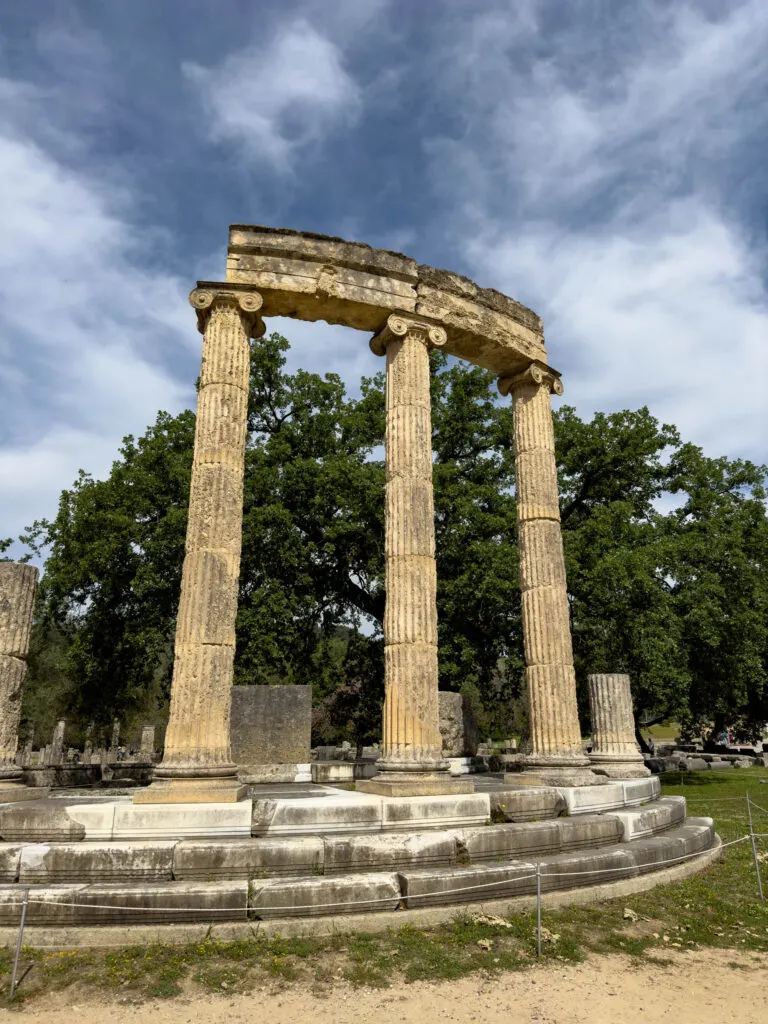
Archaeological Site of Olympia
A sprawling site, ancient Olympia is famous for being the place where the Olympic Games were born. Having held games on the site as early as 775 BC (source), they were held there every four years for about 12 centuries…what a record!
We loved wandering around the ruins, visiting sites like the Temple of Zeus and the best on-site museum I’ve ever seen. It’s easy to spend a day here because there is a lot of walking and reading to do.
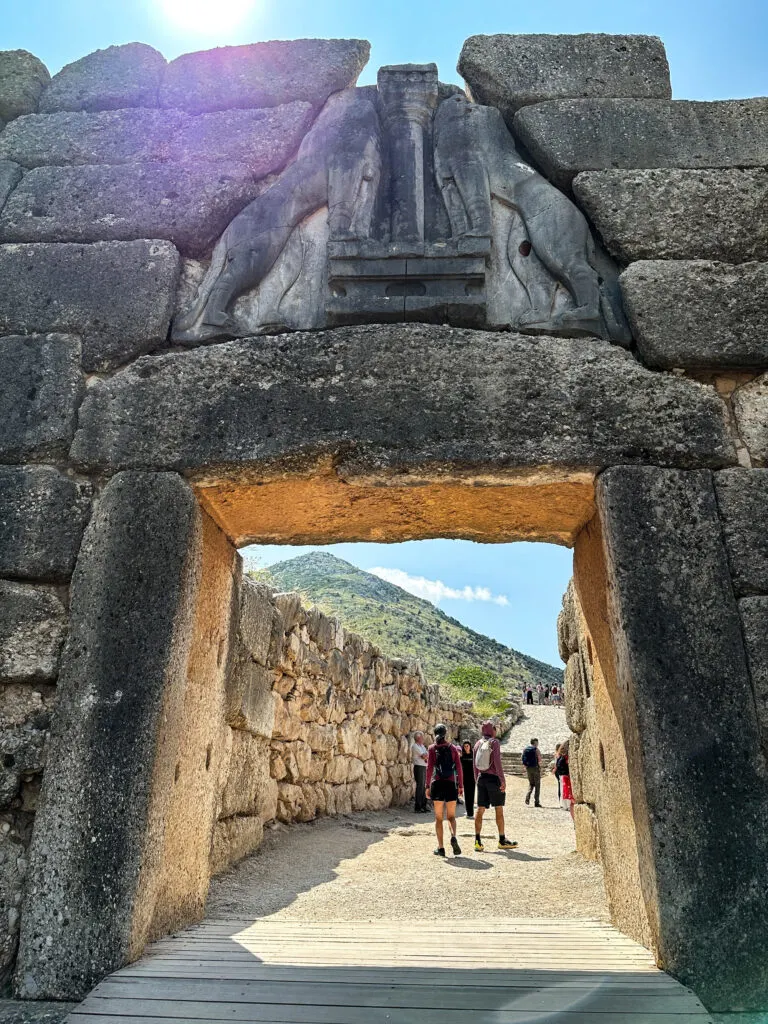
Archeological Site of Mycenae
Located right on the top of an impressive Peloponnese mountain, The Archaeological site of Mycenae has impressive ruins, which have strong roots in Greek mythology. For example, scholars believe this is where Helen, of Trojan War fame, made her home.
One of the most interesting parts of the site is the burial grounds. It is likely many royals were buried in the area, and it’s rumored that even King Agamemnon was as well. It is a very busy and popular site, but despite the crowds, Mycenae has plenty to offer. From climbing the path and entering through the famous Lion Gate to wandering around the Artist’s Quarter and more, it is well worth a trip.
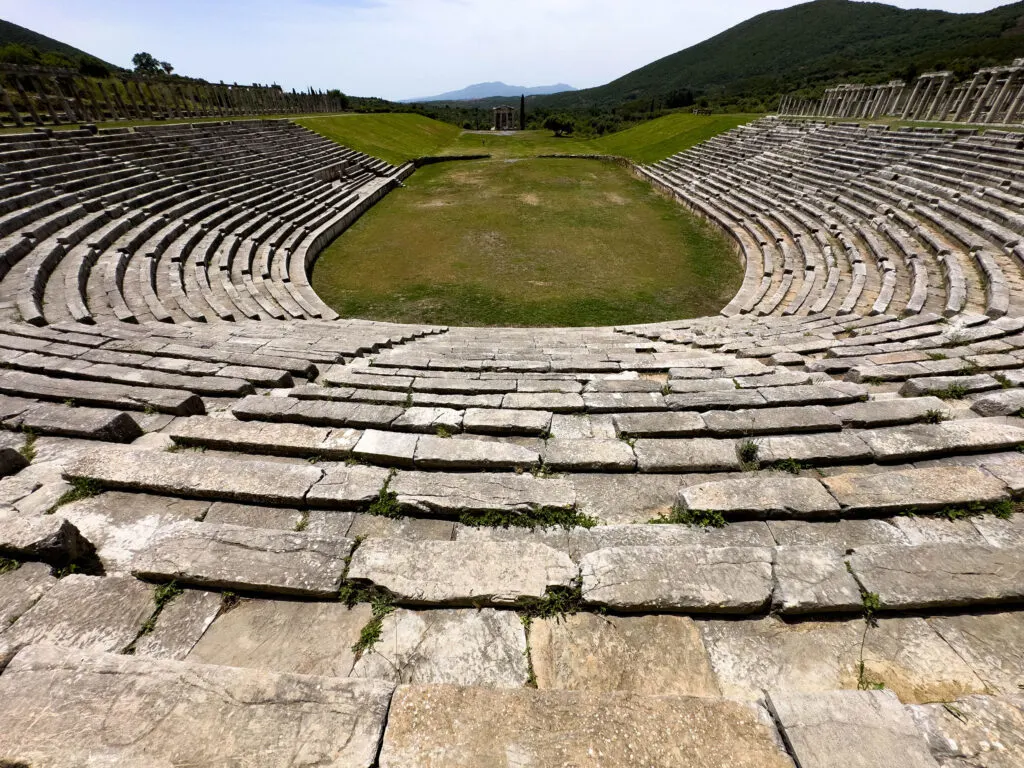
Ancient Messini
The site of Ancient Messini was not on our itinerary at first. However, every single person we talked to while we were road-tripping mentioned it, so we added it at the last minute. Boy, were we glad we did. Another vast site, and one of the most impressive parts, is where the old gymnasium and stadium are. Looking out over the field is awe-inspiring now, so I can’t imagine what it would have been like for the people a couple of thousand years ago. It was enormous.
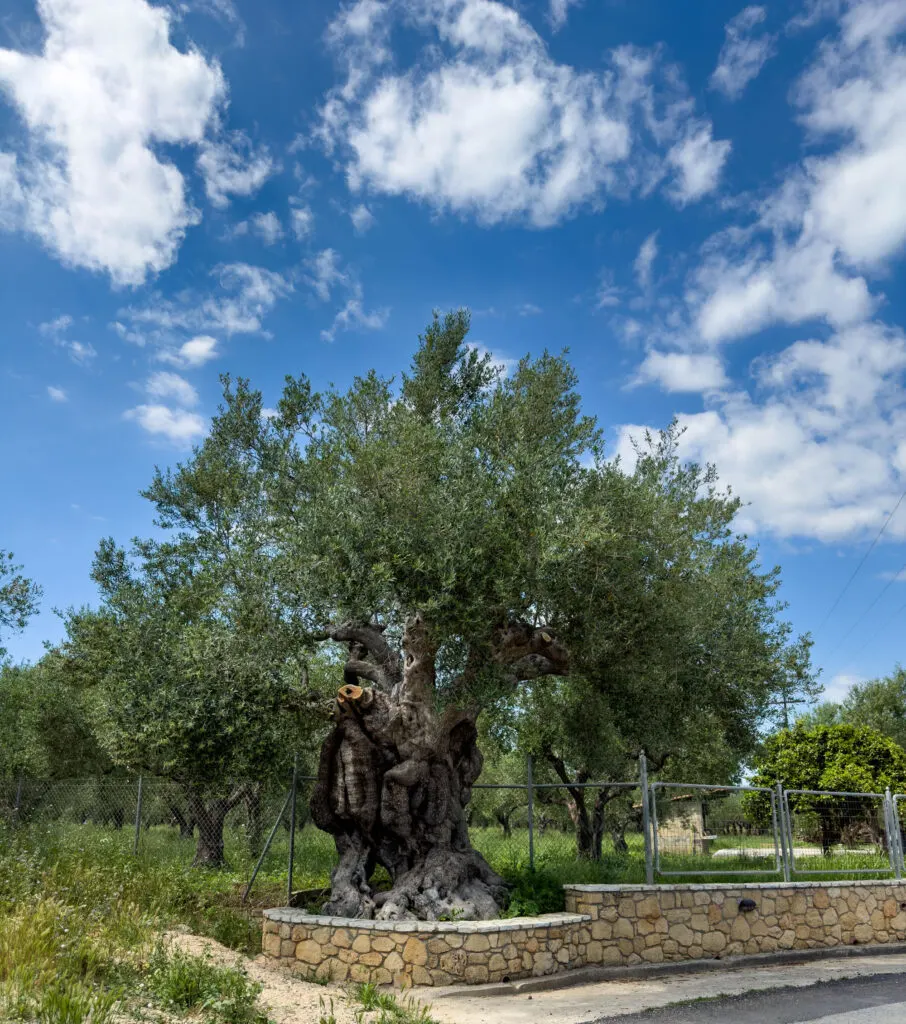
Kalamata Olives
You can’t go to Greece and not enjoy Kalamata Olives. We were on the hunt for as many as we could get our hands on. We did olive oil tastings, visited the Olive Museum in Sparta, and, you guessed it, ordered them just about every evening. Whether we had a tapenade appetizer or had them in our Greek salad, we just couldn’t get enough.
There are lots of places to visit on this list, but do they make it on our Top 5 Places to Visit in Greece? Find out by listening to this podcast!
Road Trip Essentials, Sleeping and Eating
On this trip, we decided to keep moving down the road, spending a night or two here and there along the route between Athens around the peninsula and then back to Athens. We went on this trip in mid-spring before the summer season and were rewarded with more than just wildflowers and smaller crowds. Accommodations were cheaper and we were always able to book our first choice.
This being a shoulder season, we did run into a few minor issues when it came to food. Of course, this is Greece, and everything we ate was amazingly delicious, but we missed out on the roast lamb at one taverna because they wouldn’t be starting up the big barbecues until June. Still, spring brings tons of locally grown produce and herbs to the region, so everything we ate was fresh and flavorful.
Don’t forget to check off your road trip checklist and make sure you have everything set up before you go.
Where to Stay
While there are a few resort-type options in Kalamata and along some of the coastal stretches, most of the lodging on the Peloponnese peninsula is small, boutique-style, and often family-run. Just what we love!
During a road trip, we need to be able to park the car, so our choices tend to be outside of the historical city centers (where parking a rental car for the night can be a challenge), but close enough to walk in and explore.
Tip: When using a rental, take a photo of the license plate for checking into hotels. It’s so much easier than running out to the parking lot again!
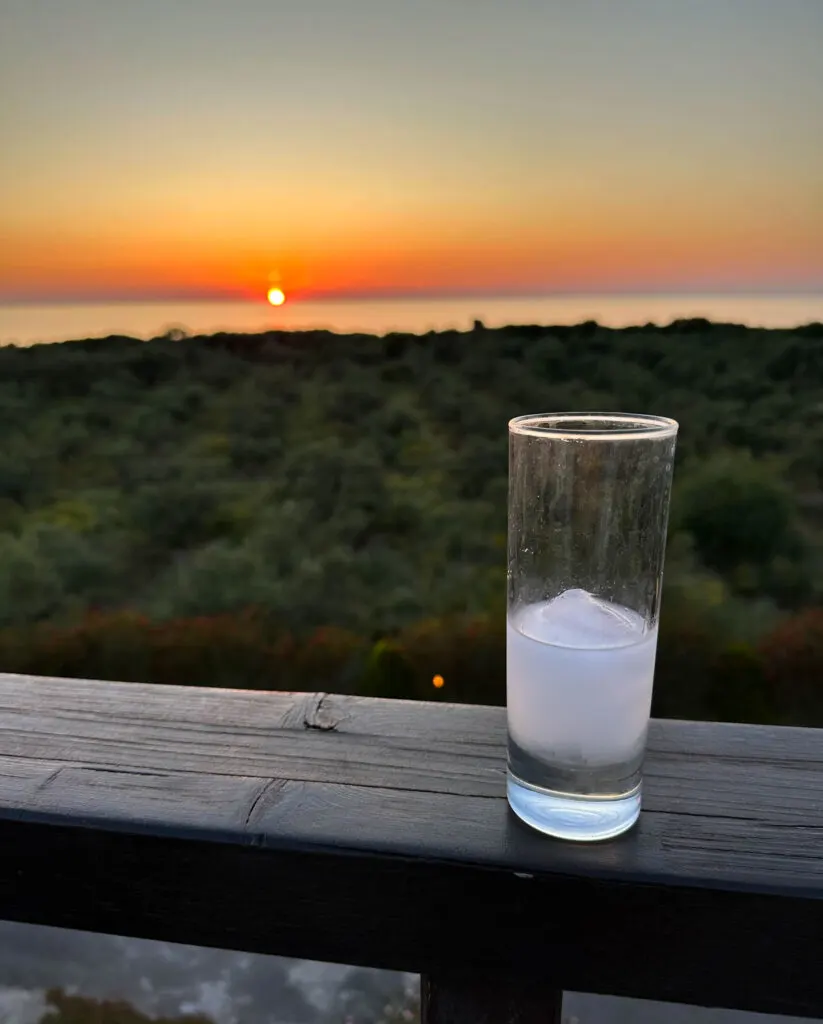
Conclusion
Getting out and road-tripping in spring just makes my heart sing, and then to find all the amazing sights and things to do along the Peloponnese peninsula, we were euphoric. Our road trip was tons of fun, and I think anyone planning a trip to Greece should do it!
Author Bio: Corinne Vail is a travel photographer, food lover, and a perpetual traveler who has been travel writing for over 14 years. For many years she lived overseas in Germany, Japan, Turkey, South Korea, and the Netherlands teaching the children of the US. military. She’s visited over 90 countries, and she’s not stopping anytime soon.
